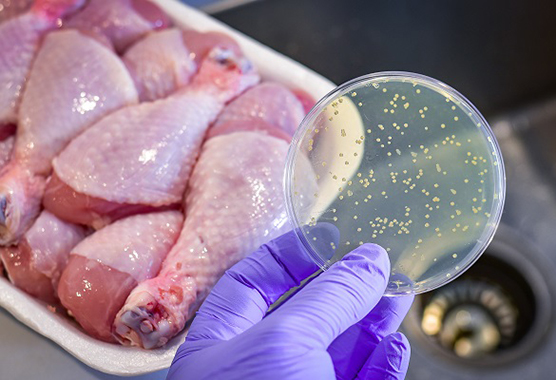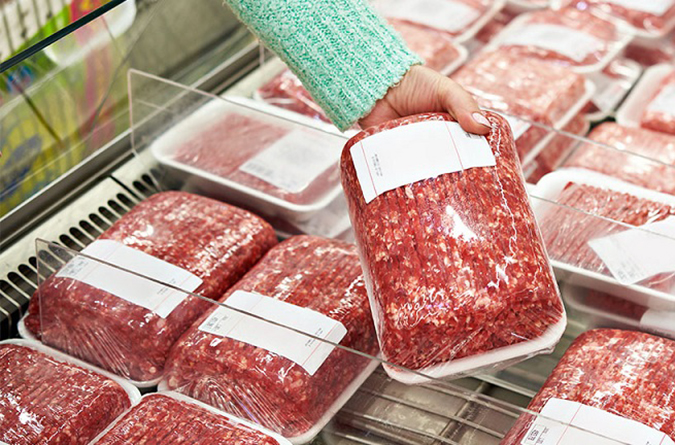Foodborne and Waterborne Illnesses
We deliver team-based care for common and rarely seen waterborne and foodborne illnesses. Count on us for prevention, timely diagnoses and proven treatments.
Medically reviewed by Daniel Dodson, M.D. on Nov. 06, 2023.

Specialized Food and Waterborne Disease Care for Your Entire Family
Our infectious disease team has special expertise in managing foodborne and waterborne illnesses. Because these diseases can affect your entire body, the infectious disease team collaborates with other specialists to deliver the most effective care possible.
Our Difference
Nationally Recognized Providers
Our infectious disease physicians and nurses are nationally recognized for their expertise in preventing infection.
Pediatric Expertise
Our pediatric infectious disease team cares for infants, children and adolescents. Experienced providers quickly diagnose and treat your child’s illness to get them feeling healthy again.
Innovative Research
Our specialists are actively involved in clinical research in infectious diseases. As a result, you may have early access to clinical trials seeking to improve your care and quality of life.
What Are Foodborne and Waterborne Illnesses?
Food and water may carry germs that can make you sick. One in six people in the U.S. experience food poisoning each year, according to the Centers for Disease Control and Prevention (CDC). About one in 44 Americans get sick annually from waterborne illnesses.
Any food carrying harmful germs can make you sick. But certain foods are more likely to carry harmful bacteria. They include:
- Eggs
- Fruits and vegetables, especially leafy kinds like lettuce
- Raw and undercooked meat and poultry
- Raw and undercooked seafood
- Raw flour
- Raw (unpasteurized) milk products like soft cheeses
- Sprouts
Some of the most common kinds of harmful pathogens found in these foods are:
- Campylobacter
- Clostridium perfringens
- E. coli
- Listeria
- Norovirus
- Salmonella
- Staphylococcus aureus
The water you drink, bathe and swim in can also carry harmful bacteria and viruses.
Five Most Common Waterborne Diseases in the U.S:
Swimmer’s Ear (Otitis Externa)
Swimmer’s ear is an ear infection in your ear canal. It happens when water leads to inflammation of the ear canal, allowing bacteria to cause infection.
Norovirus
Norovirus, also called the stomach flu, is the most common cause of food poisoning in the U.S. Telltale symptoms of a norovirus infection include severe vomiting and/or diarrhea. You can get norovirus from contaminated liquids and foods or from contact with contaminated hands or objects.
Giardiasis
Giardiasis is a foodborne and waterborne illness that causes diarrhea and other intestinal problems. It comes from a parasite called Giardia duodenalis. This parasite spreads via water contaminated by infected feces.
Cryptosporidiosis (Crypto)
Cryptosporidiosis is a waterborne disease that comes from water contaminated with the Cryptosporidium parasite. It causes intestinal symptoms like diarrhea.
Campylobacter Infection (Campylobacteriosis)
Campylobacter is a type of bacterium that causes diarrhea, fever and stomach cramps. People are more likely to get it after eating raw or undercooked poultry. You can also get it from drinking untreated water or raw milk.
Causes of Foodborne Illnesses and Food Poisoning
Foodborne illnesses are preventable. You can better protect yourself and your loved ones by learning how they spread.
The biggest causes of foodborne illnesses are:
Cross-Contamination When Cooking
Foods that may have bacteria should be kept separate from other foods. Contamination of low-risk foods may occur if you use the same surfaces or utensils during preparation of low and high-risk foods.
Improper Food Storage
Temperatures between 40 degrees F and 140 F allow harmful bacteria to grow on your food. Keep your refrigerator at 40 F or below to safely store perishable foods. Never leave perishable foods out for longer than two hours. Don’t leave them out for longer than one hour when temperatures are above 90 F.
Not Cooking Meat Long Enough
Germs that cause foodborne illnesses can be killed by heat, but not cooking meats until they reach proper internal temperatures allows bacteria to survive. These proper temperatures vary based on the type of meat you are cooking.
Poor Hygiene
When people don’t wash their hands before and while preparing food, they are more likely to contaminate it. Wash your hands for at least 20 seconds in soapy water to protect your food.
"Burden of Foodborne Illness: Findings," Centers for Disease Control and Prevention (CDC), https://www.cdc.gov/foodborneburden/2011-foodborne-estimates.html
"Findings," CDC, https://www.cdc.gov/healthywater/surveillance/burden/findings.html
Why Foodborne and Waterborne Illness Prevention Matters
Millions of people in the U.S. contract foodborne and waterborne illnesses each year. While most people recover, many experience unpleasant and life-interrupting symptoms. These diseases also lead to billions of dollars in health care costs.
Fortunately, foodborne and waterborne diseases are preventable. By following simple and cost-effective prevention tips, you can avoid these diseases and their effects.
According to the CDC, each year:
- 48 million Americans get sick from foodborne illnesses.
- 128,000 are hospitalized and 3,000 die from foodborne diseases.
- 17.5 million Americans get sick from waterborne diseases.
- 118,000 are hospitalized because of waterborne diseases, with 6,630 deaths.

Request an Appointment
As Sacramento's No. 1 hospital, you'll benefit from unique advantages in primary care and specialty care. This includes prevention, diagnosis and treatment options from experts in 150 specialties.
Referring Physicians
To refer a patient, submit an electronic referral form or call.
800-4-UCDAVIS
Patients
Call to make an appointment.
Consumer Resource Center
800-2-UCDAVIS

Ranked among the nation’s best hospitals
A U.S. News & World Report best hospital in cardiology, heart & vascular surgery, diabetes & endocrinology, ENT, geriatrics, neurology & neurosurgery, and pulmonology & lung surgery.

Ranked among the nation’s best children’s hospitals
U.S. News & World Report ranked UC Davis Children’s Hospital among the best in pediatric nephrology, orthopedics*, and pulmonology & lung surgery. (*Together with Shriners Children’s Northern California)

Ranked Sacramento’s #1 hospital
Ranked Sacramento’s #1 hospital by U.S. News, and high-performing in aortic valve surgery, back surgery (spinal fusion), COPD, colon cancer surgery, diabetes, gynecological cancer surgery, heart arrhythmia, heart failure, kidney failure, leukemia, lymphoma & myeloma, lung cancer surgery, pacemaker implantation, pneumonia, prostate cancer surgery, stroke, TAVR, cancer, orthopedics, gastroenterology & GI surgery, and urology.

The nation’s highest nursing honor
UC Davis Medical Center has received Magnet® recognition, the nation’s highest honor for nursing excellence.

World-class cancer care
One of ~59 U.S. cancer centers designated “comprehensive” by the National Cancer Institute.

A leader in health care equality
For the 13th consecutive year, UC Davis Medical Center has been recognized as an LGBTQ+ Healthcare Equality Leader by the educational arm of America’s largest civil rights organization.

